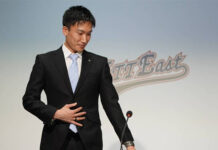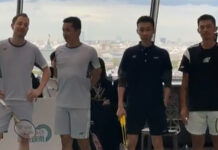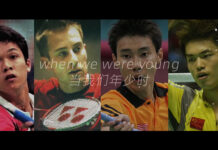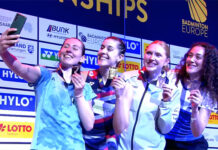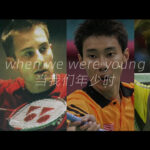June this year saw Anthony Clark return from the Aviva Open in Singapore as Men’s Doubles Champion; a great accomplishment for him and Team England. 
He is a two time silver medallist at the 2006 World Championships (with Donna Kellogg and Robert Blair) and has a cool five medals under his belt from the Commonwealth Games. Add to that the 11 National titles he holds, six European Championship medals and runners up in the 2007 Yonex All England Open, and Anthony is a force to be reckoned within the World of badminton.
It’s clear that Anthony’s badminton-playing parents made a big impression on him as a boy and one that has surely contributed to his success today.
I caught up with Anthony to ask him where he gets his motivation, enthusiasm and courage to succeed.
So Anthony, congratulations on your success in the Aviva Open Singapore Super Series event. BADMINTON England is very proud of your achievements and as Adrian Christy, (Chief Executive, BADMINTON England) says, “It makes our job a lot easier when you guys win”. How do you feel about your success in Asia?
It feels incredible, but to be honest it’s been coming for a while. Playing badminton, I soon learned that wins against people don’t mean anything. Winning titles means something, so the Super Series really feels great. Winning every title is very, very difficult, especially against countries such as China. We (Team England) don’t have sparring partners like other countries have, so it’s an amazing achievement when anyone of us wins a title.
I’m very quick to read opponents styles and together when I’m playing doubles with Nathan we have a very good understanding of how each of us will react to shots. We have been very close friends since we were 12yrs old and have been through a lot together. I believe it’s one of the reasons we ‘gel’ so well together on court and it feels very natural for us to play in doubles.
How does it feel to play against Nathan in mixed doubles when he is also your men’s doubles partner?
That’s difficult. Obviously we are very close on and off court, but when we are playing each other we are both aware that the war is on and friendship goes out the window. We’re still friends afterwards, but during that hour or two hour match time we both want to win – that’s why we’re there.
Nathan has not beaten me for three years now but Donna (Kellogg: doubles partner) and I have a very different style to Nathan’s.
With only nine more caps to go until you reach the coveted ‘100 caps’ do you have any idea when you might get there?
It will be very nice to make it to 100. I remember my first cap clearly. It was in 1998 and I smashed my opponent. Winning was an amazing feeling and it really kicked me forward to want more title wins.
I’m hoping that maybe by the end of 2010 I’ll be up near the 100 mark. With next year seeing a series of representational matches including the Thomas Cup, the Thomas Cup Finals and the Commonwealth Games we’ll have to wait and see what happens. 
At the moment I still love playing. As I’ve always said the day I no longer enjoy playing tournaments and training every day, will be the day I’ll stop. I just hope it’s not before I get to 100!
Tell me a little about how your approach to tournaments has changed over the years?
As a young player I used to find even getting into international tournaments very difficult. It’s an issue faced by all young European players as we begin our playing careers at a later stage than they do in Asia. We generally start at 18yrs old, compared to the majority of Chinese players who are already playing at World Class level by that age.
It’s very easy to dwell on this and put too much pressure on yourself to performance at a young age, as I used to in tournaments. I used to try too hard and put too much pressure on myself to win. I think it made me lose focus as well as forgetting to have fun. More often than not that cost me the game. I remember when I was at a really low point in my career losing a lot, until the pressure got too much and I thought I was going to lose every match. I was kind of miserable so decided to remember the reason I was there in the first place; to have fun doing it. As soon as I did that my performance went up and I went from losing five tournaments in a row to winning the Nationals.
So basically my approach is I’ve learnt to relax a little, though it’s hard because I am very competitive.
You reached the quarter-finals of the 2009 Yonex All England Open but didn’t make it all the way. How do you feel about the 100th All England Open in 2010?
It’s the 100th? I had no idea; I’d better start preparing (laughs).
I feel pretty good about it and I love playing there. Obviously I’m preparing for it, but at the end of the day I rely mostly on ‘using the force’ as I call it. You can do all the preparation in the world but you have to read the game as it happens and be very aware as I am.
The All England is a fantastic tournament. Its badminton’s equivalent of Wimbledon and it’s being jazzed up a little more each year. The 2009 All England was a great spectacle.
I’ve noticed every major tournament is raising the bar with its entertainment value. I think badminton is moving away from the traditional image of gentlemen playing in the garden to a much more modern dynamic and fast professional sport. It’s great to get the crowds involved and entertained.
You mentioned the entertainment value of the Yonex All England Open. What do the crowds add to your performance or experience at these major competitions?
It has a massive effect. I love crowd participation and we should encourage the crowds to get involved more. Even if it’s boo’s I love it because it gives you the chance to turn it around and get then cheering for you to win. There are a lot of fans from Asia who come to events and they really get involved, which I think is great.
Who do you see as your toughest opponents, if any?
There are too many to mention. If I were to give you a list of names you would end up with a book and that’s really a credit to the sport. I have great respect for other high performing athletes because I know what it takes. If I had to mention a few off the top of my head it would include the Chinese and Korean teams. There are also some Danish pairs who are great.
One tough opponent and badminton great I never had to honour of playing against was Rexy Mainaky. He coached Team England for a number of years and was a total natural at the sport. He was a real inspiration and helped to change my approach to badminton training. I really have him to thank for taking me from a good player to a World Class player.
What are your thoughts about your role in promoting the sport of badminton to a wider audience? What do you do, what will you do?
I do my best to promote the sport on and off court. Center Parcs is a great partner for our sport – they are always professional and friendly. It’s great that they are so involved with badminton. 
In my mind a professional league is really the only way to gain a mass audience. It’s a huge task that requires a lot of finance, but it will bring badminton to that wider audience.
If darts can do it, so can we! When I’m not training or on the road I find darts very entertaining to watch especially with all the banter that goes with it. I would love to see that with badminton, it would be very good for the sport.
How do you feel about receiving the accolade of Player of the Month?
I’m delighted to receive the million pound cheque and trophy thank you (laughs). No really, I appreciate every opportunity when an organisation or individual takes time out to give me a pat on the back and say well done for my efforts. It means a lot to me.
At the same there are a lot of people who have put in an incredible amount of effort with me to help me gain every award. People like my coaches, physiotherapists, psychologists, nutritionists, video analysts, not to mention the invaluable support from friends and family. You certainly don’t get there without help and encouragement of these people.
I occasionally receive a letter from our board members congratulating me. That’s always nice to receive as I know then they are aware of the efforts being put in by everyone. It would just be nice to get the £1 million cheque along with it. Maybe it’s in the post… (laughs)



 From everyone at BADMINTON England, we congratulate Anthony for his grand success and dedication to badminton. We look forward to celebrating his 100th cap soon.
From everyone at BADMINTON England, we congratulate Anthony for his grand success and dedication to badminton. We look forward to celebrating his 100th cap soon.